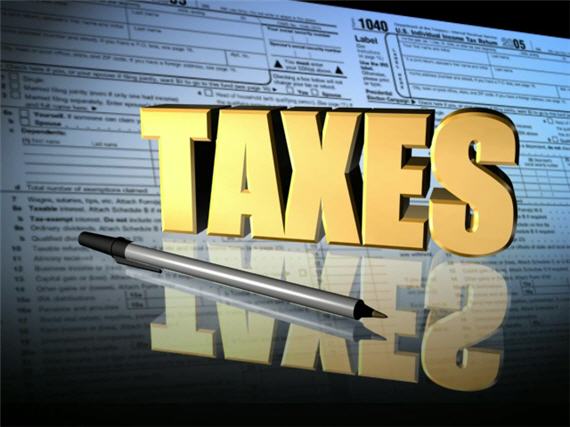Study: Buffett Rule Would Generate Less Than $3 Billion Per Year In Revenue
What happens when political pandering substitutes for serious fiscal policy.
A new study from the Joint Congressional Committee On Taxation estimates that the s0-called “Buffett Rule,” which would modify the tax code to purportedly ensure that multimillionaires pay a tax rate of at least 30 percent on income over $1,000,000 regardless of the source would generate very little tax revenue:
WASHINGTON (AP) — A bill designed to enact President Barack Obama’s plan for a “Buffett rule” tax on the wealthy would rake in just $31 billion over the next 11 years, according to an estimate by Congress’ official tax analysts obtained by The Associated Press.
That figure would be a drop in the bucket of the over $7 trillion in federal budget deficits projected during that period. It is also miniscule compared to the many hundreds of billions it would cost to repeal the alternative minimum tax, which Obama’s budget last month said he would replace with the Buffett rule tax.
(…)
In an analysis provided to The AP on Tuesday, Congress’ Joint Committee on Taxation estimated that a bill introduced last month by Sen. Sheldon Whitehouse, D-R.I., attempting to enshrine Obama’s proposal into law would collect $31 billion through 2022. The measure has little chance of advancing soon, especially before the November elections.
Ed Morrissey helps us to put these numbers into perspective by reminding us all of the projected deficit figures for the next five years:
- FY 2012 (current year) – $1.3 trillion
- FY 2013 – $977 billion
- FY 2014 – $702 billion
- FY 2015 – $539 billion
- FY 2016 – $529 billion
That $3 billion per year amounts to:
- 0.23% of the FY2012 deficit
- 0.31% of the FY2013 deficit
- 0.43% of the FY2014 deficit
- 0.56% of the FY2015 deficit
- 0.57% of the FY2016 deficit
And those are the projected budget deficits, the actual numbers are likely to be higher, meaning that the “Buffett Rules” contribution to deficit reduction will be de minimis at best. Of course, as I’ve noted before, the “Buffet Rule” has little to do with sound fiscal policy and everything to do with election year politics:
[I]t’s rather apparent that the “Buffett Rule” has much more to do with 2012 election politics than it does with putting forward a responsible plan to fix our fiscal problems:
The White House, however, maintains that to focus purely on Buffett revenue is to miss the point. White House press secretary Jay Carney stressed to reporters on Wednesday that there are “millionaires and billionaires who pay taxes at a substantially lower rate” than poorer Americans. “The President simply believes that as a matter of principle, that unfairness ought to be changed.”
This may be smart politics. The polls would seem to indicate that it is. However, it’s not necessarily smart fiscal policy.
Indeed, it is not. Nor is it a serious attempt to address our long term problems.
I’ve said numerous times that we need to address all the legs of our fiscal crisis, including discretionary spending, entitlements, and taxes. Yes, that’s right Republicans, taxes need to be on the table, meaning that we need to talk about reforming and simplifying the Tax Code even if it means that some people end up paying more in taxes at the end of the day. The way the Obama Administration is approaching things, however, is exactly the wrong way to do it. What we need is comprehensive reform. What the President is proposing, though, is to just graft yet another tax rate onto an already overly voluminous, overly complicated Tax Code. That’s not going to solve our real problems and, as this study shows, and others have shown, the amount of revenue likely to be generated is minimal at best. That’s what happens when you treat the Tax Code as a political football, as both parties have been doing for decades now. As I said, though, the Buffett Rule isn’t about tax reform, it’s about political pandering.






Another way of describing it would be symbolic at a time when one of the presidential candidates who has an income of $22 million a year is paying 13.9% of his income in taxes. In this context it’s rather a potent symbol of what’s wrong with our tax code. Bottom line is that the tax take has to return to around 20% of GDP from its current 15%. Some of this is going to come from the economy returning to optimum capacity but the balance is largely going to have to come from tax increases which are going to fall mainly on higher earners because relatively they are corralling such a large slice of income. You also talk Doug as if the Buffett rule has a chance of becoming law. You’re more likely to win $250 million on the lottery.
A tax increase was always going to be counter-productive. Draining more net financial assets at a time the economy is still on unsteady footing would have generated pro-cyclical pressures. Forget the political posturing; the Buffet Rule is just bad economics.
A) I’m not sure the Buffet rule is meant to address the deficit. It’s primary goal, it seems, is to equalize tax rates (or something). In other words, it’s not about raising more money. We should not expect this measure to “fix” the deficit any more than we should expect a heartburn drug to cure cancer.
B) Considering that this “tax on the wealthy would rake in just $31 billion over the next 11 years,” I don’t think anyone can argue that’s a terribly huge burden on the wealthy if the rule were invoked.
C) The hope is always that smart politics this year will lead to smart fiscal policy next year. That’s probably NOT going to happen….but that’s the hope. So three cheers for smart politics.
Yeah, this one isn’t really about raising revenue. It’s about highlighting the fact that the current tax code is screwy. It’s possibly the easiest illustration of that.
As policy, meh. We need tax reform that does a whole lot more. [Ideally, that reform will address this, small as it is].
I have long disagreed with this typical response to proposals that are partial solutions to the problems they are intended to address. While I am against implementing the Buffett rule, my objection isn’t because it won’t solve the deficit completely, all by itself.
To my mind, it’s like the response to proposals that would increase domestic crude oil production. “The oil produced would just be a drop in the bucket!” “It would be years before this would have any impact on gasoline prices!” If it makes a partial contribution, that’s a contribution nonetheless. And if we had stepped up domestic oil production years ago, it would be coming online now. If we start now, it’ll still be available sooner than if we wait until next year to get started.
So if we implement some revenue/budget changes that make even a small dent in the deficit, however much they save is that much less that a bigger solution is going to have to deal with. “A billion here, a billion there, and after a while we’re talking real money!”
@Herb: I would argue deficit reduction is of relatively low priority, considering the myriad ailments creating drag on our economy. Addressing our current account deficit, dealing with unsustainable levels of student loan debt and scrapping our hideously complex tax code would I think be a better use of our time.
@Ben Wolf: I’d be more comfortable with reforming or simplifying our hideously complex tax code rather than scrapping it. The hideous complexity of the code is a reflection of the hideous complexity of our society.
@Herb: I’d prefer gradual reform as well, but I no longer think that’s possible. Sometimes a foundation becomes so rotted you’ve got to blow the whole thing up and start again.
I think the Buffet Rule, and similar tax code clean-up, is the right thing to do.
To say let’s not do the right thing, because it does not have an immediate yield, is not going to convince me.
BTW, you notice the “sum one year when you want a thing to be small, and extrapolate to 2030 when you want it to be large” rule applies? 😉
Also note that Doug’s argument is a classic redirection. Do not look at millionaires or billionaires paying low taxes. No, look at the whole budget. See! We don’t need to tax millionaires or billionaires!
@john personna:
Precisely. Doug is trying to deflect attention from the sausage by criticising the sizzle.
@Brummagem Joe:
I said no such thing unless you ignored what I wrote about comprehensive fiscal and tax reform. The question when we do that, though, shouldn’t be “how much money can we get from those evil rich people,” but what kind of tax system would be most efficient at raising the most revenue while having the least disruptive effect on the economy.
@Boyd:
I see you point but if we’ve learned everything over the past 30 years or so it’s that adding more and more rates, revisions, exceptions, exemptions, and deductions to the Tax Code doesn’t solve any problems. Comprehensive Tax Reform. That’s the answer.
I’m not sure the “Buffett rule” even would rake in that piddling $31 billion. How many of those multi-millionaires simply would take off and become tax exiles? Probably quite a few.
Incidentally, I’m all about comprehensive tax reform.
What I’d like to do is repeal the 16th Amendment, toss out the entire tax code, abrogate forever the concept of a federal income taxes and then fund the federal government with a national sales tax on all retail purchases, which solely exempts base foodstuffs, water, milk, baby formula, prescription drugs and medical devices.
The notion of a federal tax on savings, investment, R&D and capital expenditures is sheer folly.
Of course the foregoing is a pipe dream and I’d be smoking crack if I actually thought it would ever happen.
So I’ll settle for a comprehensive reform package that’s pretty darn similar to the one proposed a few months ago by Jon Huntsman, although I would want one rate, not three rates. Let’s move towards a flat tax with no deductions and no exemptions. To my way of thinking that’s a helluva lot better than the flaming train wreck with which we’re currently saddled.
On the spending side I would cut everything, except for air superiority fighters, next-generation subs and destroyers, medical care and coverage for veterans and Social Security for people either currently drawing benefits or age 55 or older. Everything else would be on the chopping block, commencing with Medicare, Medi-Caid and Social Security for people born after 1957. I would raise the eligbility threshold for Social Security and Medicare. I would hard cap COLA adjustments. For Medi-Caid I would cap those benefits and then block grant those funds to the individual states. I also would cap and block grant all AFDC payments and further would tighten the attendant eligibility requirements. It’s high time we get people off the dole.
Oh, I forgot: I wouldn’t cut any of our drone programs. They’ve been amazingly successful and they keep pilots out of harm’s way. Hell, I’d double the budget for the Predator and Global Hawk programs and their respective progenies. To pay for that I’d defund at the federal level NPR, Planned Parenthood and the National Endowment for the Arts. I’d also defund NCLB and related education programs.
@Doug Mataconis:
I note that a progressive tax system was not one of your goals.
@Doug Mataconis:
I am with you on comprehensive reform. But, I’d put the idea of progression in there from the start. Then of course you can argue later about how many brackets there should be, and at what rate.
(Rumor is that Ryan is going to introduce a 2-bracket system, right? That’s pretty hard to defend on fairness grounds, as if there was no difference between me (working engineer) and Buffet, and as if we felt tax pain equally, or had equal ability to pay.)
@Doug Mataconis:
Why do use this operatic language Doug, I don’t seem to remember the president mentioning evil rich people. The fact is politics is very often about symbols. The Buffett rule isn’t going to become law in a million years but it’s a useful device to draw attention to inequities in the tax system (particularly given the Republican candidate LOL). So I don’t really see what you’re getting so excited about.
@Brummagem Joe:
Obviously he “those evil rich people” it because that’s the only justification he sees for a progressive system. It isn’t ability to pay, it isn’t fairness, it’s “class warfare” every time.
@Tsar Nicholas:
Yeah right Nick let’s return to the halcyon days of 1900. Do you have parents Nick? Do they currently receive or are they in the next 20 likely to become recipients of Medicare and SS? Do you know what a modest health insurance program for a 65 year old retiree would cost? Have you thought about the consequences should they become indigent? They move in with you.
@Tsar Nicholas:
In other words, “I live in la-la-land, don’t listen to me.”
The report assumes a static situation, but, as pointed out above, those uber rich will s8mply find ways to avoid the taxation, meaning even lower revenues. This is simply pandering to the unhinged liberal base who are upset that other people made money.
@john personna:
The fact is which the Dougs of this world won’t recognise is that federal expenditures are at or around $3.5 trillion. This is not going to change whatever Grover Norquist or Paul Ryan thinks. Therefore the question arises how do we fund this and the only way is with a progressive income tax…..particularly since the top 1% of income earners are corralling around 20% of incomes. You can reform the entire tax system and within 10 years it will be just as complicated again because an army of special interests will immediately go into action to win new tax breaks. So why bother. The simple and obvious solution is to let ALL the Bush cuts expire, eliminate loopholes like carried interest and take capital gains back to 20%. Do this and the deficit problem is history not that Republicans are interested in the deficit or they’d get serious about revenues.
@Brummagem Joe:
Ten good years? There is no need to make the perfect the enemy of the good.
Actually that’s the problem with Doug’s complaint after all. It is the perfect as enemy of the good.
@William Teach:
Sure, the receipts may be lower than the more optimistic projections, but they won’t be lower than they are now. So even at $3 billion a year, it’s one step closer to closing the budget deficit.
@john personna:
Except there isn’t going to be ten good years because any serious reform of the tax system is going to be stymied by one interest or the other. So this leaves tweaking the existing system which in reality is all that’s going to happen.
Well hell, why tax the rich at all, if they will always find a way out of paying their taxes, right? And yes, this pandering is so awful…much better pandering is trying to lower the tax rates on all the “job creators”…no unhinged people involved there…
@Doug Mataconis: “Incidentally, I’m all about comprehensive tax reform. ”
Is it as disturbing to you to be on Tsar’s side of this issue as it is to me?
@Tsar Nicholas:
I think it’s funny that you go for the usual targets rather than say….reconsidering our commitment to private contractors. Not going to save much money cutting the NEA….
Fire Geo Group instead.
@Brummagem Joe:
See, this right here is what so many forget about social insurance when calling for its repeal: without it, you would have to deal with Grandma. And man, Grandma can be a bitch sometimes.
@William Teach:
So, the essence of your statement is, “We shouldn’t tax the rich because the rich are so wily as to be untaxable, using their wiles to hide their monies.”
It’s, like, why ever go after master criminals? They’ll just get away, hell let’s remove the laws they’re breaking so they become pillars of the community!
@Brummagem Joe:
You’re pretty close on that 20% figure – in 2009 the top 1% earned 16.9% of AGI. They also paid 36.7% of all federal individual income taxes. Not everyone is like Romney and Buffet, with income coming almost exclusively from capital gains. A whole lot of that 1% has earnings coming almost completely from wage income and their effective rate tends to be pretty darn high. Combine that with state, local, sales, property, and all the other taxes out there, and you can get to a pretty damn high percentage of income going to pay for government in some form.
Prove it…